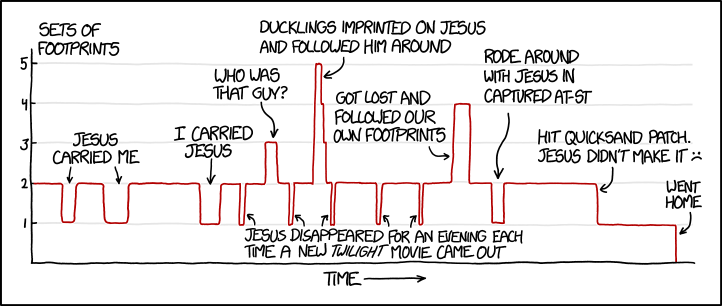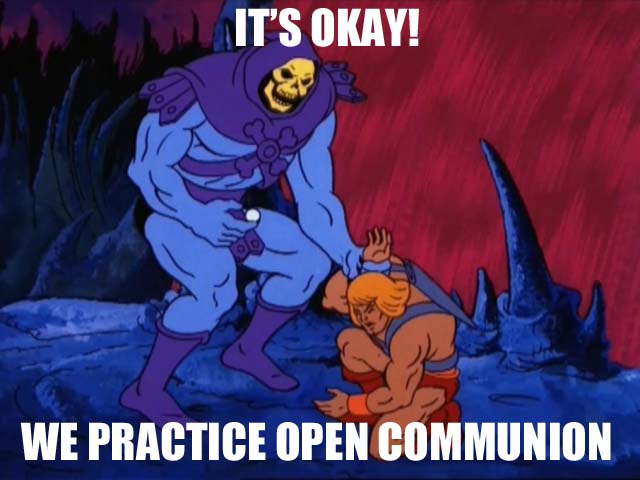
Click here to listen to this week’s episode of The Mockingcast.

“Footprints” via XKCD.com (http://xkcd.com/1575/)
1. Don’t think we’ve ever led off with the Social Science Study of the Week, but this one is so good it bears all our attention. Quartz reported this week on new research confirming that “Being a good parent will physiologically destroy you”. Check it out, ht JD:
Researchers surveyed 247 pairs of parents and their adolescent children on how often and to what degree parents could understand their children’s feelings and respond with appropriate concern. They also took blood samples. Empathetic parents and their children were both better off psychologically. Children of empathetic parents also showed lower levels of inflammatory markers. Their parents were just the opposite. Their samples revealed this low-grade systemic inflammation.
Empathy requires us to push our own feelings aside to focus on someone else’s, an effort linked to increased stress and higher inflammation. Empathetic parents may also be more willing to sacrifice their own health for their children’s sake, forgoing things like sleep, exercise, and other activities that could mitigate the stress of caregiving.
The theological implications are pretty rich, no? The incarnational ones at least. The notion that love takes a physical toll on the one doing the loving may be unpleasant, but it resonates with the Gospel for sure, and stands as a reproof to all who might be tempted to scrub the blood off of Christianity. Empathy cannot be divorced from corporeality–so presumably the deeper the empathy, the more severe the bodily cost. Reminds me a bit of that article on The Science of Atonement from a few years ago.
Of course, there’s a thin line between empathizing with your child and overidentifying with them in helicopter-like fashion. The latter creates just as much suffering as the former, but sans the psychological benefit the studies mention.
On a separate parenting note, if you haven’t watched this Chris Ware-animated clip on judgment and forgiveness in mother-daughter relationships, you’re missing out:
2. One theme that’s been popping up quite a bit in the past few weeks is that of moral illiteracy. Not disagreement or debate, per se, but an inability, especially among recent college graduates, to speak in or comprehend the language itself. No doubt this goes along with the triumph of subjectivity and the ensuing banishment of (most) moral categories from the public square, for both better and worse. David Brooks has long been trumpeting this refrain (see here and here for some recent examples). Of course, it’s impossible to run away from Good and Evil forever–Health and Sickness don’t always cut it when describing the joys and sorrows of human existence. Anyway, writing for The New Yorker, Joshua Rothman walks us through the field of Leadership Science, which he claims has become an unexpected avenue for reintroducing virtue ethics:
In our rationalized world, there isn’t much space for earnest discussion about virtue; the subject of leadership sometimes creates that space. It’s a Trojan horse for a version of moral philosophy…
Rothman goes on to discuss the catch-all that “leadership” has come to function as in our society. Depending on who you ask, it contains nearly every quality we venerate, even those are that are openly contradictory–an arbiter of righteousness in other words, albeit a transparently crushing one:
“Experience” and “expertise” are virtues with downsides. “Leadership” sums up, in a vague way, everything that’s desirable and none of what’s not…
In 1991, Joseph Rost, a professor of leadership studies at the University of San Diego, read as much of the modern leadership literature as he could, reaching back to 1900… Rost found that writers on leadership had defined it in more than two hundred ways. Often, they glided between incompatible definitions within the same book: they argued that leaders should be simultaneously decisive and flexible, or visionary and open-minded. The closest they came to a consensus definition of leadership was the idea that it was “good management.” In practice, Rost wrote, “leadership is a word that has come to mean all things to all people.”…
To some extent, leaders are storytellers; really, though, they are characters in stories. They play leading roles, but in dramas they can’t predict and don’t always understand. Because the serialized drama of history is bigger than any one character’s arc, leaders can’t guarantee our ultimate narrative satisfaction. Because events, on the whole, are more protean than people, leaders grow less satisfying with time, as the stories they’re ready to tell diverge from the stories we want to hear. And, because our desire for a coherent vision of the world is bottomless, our hunger for leadership is insatiable, too. Leaders make the world more sensible, but never sensible enough.
“Story” here is pretty much a euphemism for law, i.e., a narrative which flatters and oppresses in equal measure. Which may explain the conflicted relationship we have with so many of our leaders, the impossible mix of scapegoat and substitute we demand of them (…see item 1), the reason why we spit them out with such predictable regularity. I can’t help but think of the transference we foist on those in charge, especially in the church. Right, Skeletor?

3. While we’re on the moral illiteracy tip, a couple of weeks ago Aeon ran a fascinating essay by Jennifer Ratner-Rosenhagen on “The Lost Hope of Self-Help”. She traces the roots of “Habit Literature”–another word for self-help literature–underlining how the genre has lost almost all hints of the ethical seriousness that used to characterize it. As a result, it has become what she calls a “technology of self-absorption”. The story she tells about Benjamin Franklin is pretty priceless:
Individual improvement has always been the purpose of habits literature, but the genre used to require appraising the society in which the self, and the habits, formed. Historically, thinking about habits without social contexts or ethical consequences was unthinkable. Today it is axiomatic.
In his Autobiography, the 79-year-old Franklin recalled his youth when church services seemed to hold no promise for his moral perfection. So he took matters into his own hands. He developed a hierarchy of 12 virtues he wanted to become second nature: temperance, silence, order, resolution, frugality, industry, sincerity, justice, moderation, cleanliness, tranquillity, chastity. When a Quaker friend gently reminded him that he had left out one virtue he could use a little more of – humility – Franklin conceded and added it to the list to bring it up to 13…
In addition to [Franklin’s] knack for industriousness and regimentation, he had his common-law wife Deborah to take care of their two children and his illegitimate son; a devoted sister Jane, who, though an impoverished mother of 12, served as her elder brother’s scribe, family record-keeper, and personal soap-maker; as well as household slaves who tended to his earthly needs so that he could devote his time to cultivating his virtues. He had, in short, a virtual staff of loved ones and subordinates to help him cultivate his self-reliance. Today’s habit industry is similarly blinkered about the social and economic architecture which for many makes cultivating personally-rewarding habits possible.
4. On to the fun stuff. The NY Times Magazine published Naomi Fry’s ridiculously great Letter of Recommendation for Bravo’s TV’s Vanderpump Rules, which she differentiates from its many, many “reality” competitors by emphasizing how non-achievement oriented the show manages to be. That is, Fry has actually written a not-so-veiled critique of American restlessness and the human addiction to ladderclimbing:
American reality television has a near-pathological focus on success. It makes no difference whether a show documents an actual competition (‘‘Survivor’’) or a milestone refigured as a competition (‘‘The Bachelor’’), or offers some version, however far-fetched, of everyday life (‘‘Keeping Up With the Kardashians’’). The trajectory is the same: relentlessly upward… In the personal-growth-obsessed universe of reality TV, ‘‘Vanderpump’’ stands apart. The SUR staff members, with their stardom-primed appearances — their snugly sheathed gym-toned bodies and smooth Botox-injected brows — have been locked in a state of readiness that hasn’t yet led to ascent…
I moved to America more than a decade ago from Israel and found myself half-seduced and half-flummoxed by the very American fixation on growth and improvement. Seduced because it seemed the law of the land to side with the winners, no matter the circumstances or cost; flummoxed because there appeared something unsustainable, and maybe even slightly fascistic, in this unswerving focus on worldly achievement… Thinking of stasis as one possibility among others — even if just for limited periods of time, even if just in the sense of loosening the hectoring voice in your own head that urges you to always keep marching forward — seems a culturally viable, emotionally necessary option.

6. In humor, on The Toast, Mallory Ortberg reviewing The 95 Theses is as good as it sounds (Part 1 and Part 2). But the find of the week, hands down, is Episcopal Skeletor. Count the Internet out at your own peril, people.
7. The NY Times Magazine just published its annual Work issue, and surprise surprise it includes quite a lot of relevant stuff on our beloved cult of productivity. The most gut-level article is probably the one on the lamentable rise of desktop dining:
In the 1987 movie ‘‘Wall Street,’’ Gordon Gekko famously remarks, ‘‘Lunch is for wimps.’’ It has proved to be a prescient line in the American workplace, where taking time off for lunch has increasingly become a sign of idleness… Now some 62 percent of professionals say they typically eat lunch at their desks, a phenomenon that social scientists have begun calling ‘‘desktop dining.’’
8. Thanks again to Christ Hold Fast for having me at their conference a couple of weeks ago. They were kind enough to post the video of my talk earlier this week:
While I was down there I found out that Grace Untamed: A 60-Day Devotional just hit the shelves. It collects excerpts of a bunch of Liberate talks, including those given by yours truly. An honor to be in that company. Also, on a related note, our friend Tullian Tchividjian gave his first interview in quite some time this past week, and it’s pretty special. You can listen here.
9. Lastly, Impose Magazine did an awesome profile of the man who’ll be DJ’ing our EpiscoDisco in April, complete with a brand-new mix. Very groovy.
Strays
- Two great podcasts worth mentioning: The Olmsted Salon, run by our friends at Calvary St George’s in NYC, and God and Comics, a must for anyone interested in that intersection.
- A touching article about Protestant missionaries in war-torn Ukraine
- “Jane Eyre and the Invention of the Self” over at the Atlantic
- If you only read one review of Terence Malick’s new Knight of Cups, make it Brett McCracken’s.
- This just in: It’s Almost Weirder If You Don’t Lie on Your Online-Dating Profile
- Finally, the new book on The Replacements looks amazing:

COMMENTS
Leave a Reply












